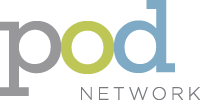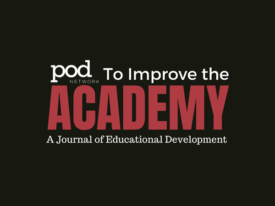To Improve the Academy (TIA) is the flagship peer-reviewed publication of the POD Network. TIA, an open-access, electronic journal, is focused on faculty, graduate student and professional student, instructional, professional, and organizational development. TIA publishes two issues annually, with occasional special issues responsive to the profession and moment.
TIA was first published in 1982 as a printed, edited book with the title To Improve the Academy: Resources for Faculty, Instructional, and Organizational Development (Jossey-Bass). In 2013, it moved to an electronic-only format with a revised title, To Improve the Academy: A Journal of Educational Development (Wiley). Articles published when it was a print publication (i.e. 2013/Volume 32 and earlier) are cited as book chapters, and those published after 2013/Volume 33 are cited as journal articles.
To Improve the Academy endeavors…
- to reflect the diverse community of faculty, staff, and administrators who contribute to the rigor and improvement of teaching and learning in higher education;
- to shape the conversation and drive inquiry regarding the scholarship of educational development;
- to support innovation in scholarship, research, practice, and the discipline of educational development itself.
To Improve the Academy publishes scholarly articles for educational developers and those interested in professional, instructional, and organizational development in higher education. The journal welcomes submissions for both practice- and research-based works that advance the field of educational development. Contributions include, for example, descriptions of novel educational development programs with evidence of effectiveness; research studies focused on programs/interventions/initiatives or the work or experiences of educational developers; narrative inquiries into educational development; theoretical or conceptual works that contribute to our understanding of educational development; commentaries on the state of the field.
TIA is committed to diversifying the pool of writers who contribute to educational development scholarship to include new educational developers, BIPOC (Black, Indigenous, People of Color) authors, and members of groups historically underrepresented in educational development scholarship (e.g., educational developers at community colleges and Historically Black Colleges and Universities (HBCUs)). We know that scholarly writing takes time, cultural capital, and financial resources, and that institutions vary on available resources. Therefore, the TIA editors have launched a POD Academic Writing Scholars program to support writers from identity groups and/or institutions that are historically underrepresented in educational development scholarship. For the most up-to-date information, check the POD Network’s Call for Proposals and Deadlines web page.


